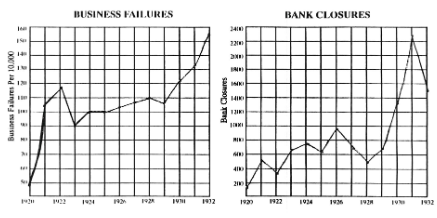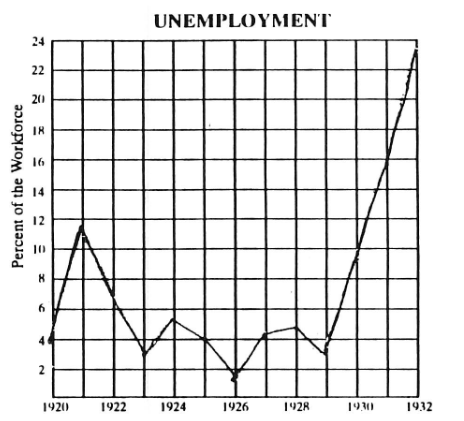1930s and the Great Depression Exam
1/24
Earn XP
Description and Tags
we know
Name | Mastery | Learn | Test | Matching | Spaced | Call with Kai |
|---|
No analytics yet
Send a link to your students to track their progress
25 Terms
When there is an economic contraction (sometimes called a down-turn, "recession" or, if its particularly bad, a "depression") it spirals and compounds when:
1) People stop buying, businesses lay-off labor, people spend less because they are worried about their jobs
2) People start saving, businesses cut prices, governments impose tariffs
3) Businesses raise price, people stop buying, people are laid-off or fired
4) Supply outstrips demand, prices are cut, people buy more, tariffs are imposed
1) People stop buying, businesses lay-off labor, people spend less because they are worried about their jobs
Among the reasons the Great Depression was "great" (as in a long-lasting economic decline) was:
1) People lost faith in banks, which could not loan money for businesses to start-up or expand, so the economy stagnated
2) People lost all their money in the stock market
3) The stock market dropped really fast because stocks were overvalued
4) Hoover’s “voluntary cooperation” simply didn’t work
1) People lost faith in banks, which could not loan money for businesses to start-up or expand, so the economy stagnated
The problem of the concentration of wealth as a contributing factor in the Great Depression is that:
1) A handful of super-rich do not have the ability to support a nation’s economy exclusively on their own
2) The very rich exploit the labor of the working class
3) The bourgeoisie and “investment class” don’t produce anything
4) The rich would gain an advantage over everyone else by insider trading
1) A handful of super-rich do not have the ability to support a nation’s economy exclusively on their own
Speculation on the stock market contributed to the Great Depression by:
1) Artificially inflating the value of stocks
2) Encouraging insider trading
3) Encouraging people to invest in the stock market
4) Encouraging agricultural over-production
1) Artificially inflating the value of stocks
"Paper profits" were a contributing factor to the Great Depression because:
1) Businesses didn’t have to disclose their financial health, leading to speculation
2) People were investing expecting the same big returns on their investments year after year
3) Companies weren’t making any profits, therefore people didn’t know what they were buying
4) Currency was literally made of paper rather than special shit like gold or silver
1) Businesses didn’t have to disclose their financial health, lending to speculation
The narrow economic expansion of the American economy in the 1920s contributed to the Great Depression by:
1) Consumers not needing to purchase many of the new technologies more than once
2) Having the rich get richer and the poor get poorer
3) Concentrating wealth in the hands of only a few individuals who alone could not keep a national economy afloat
4) Increasing the risky loans banks were making
1) Consumers not needing to purchase many of the new technologies more than once
The Smoot-Hawley tariff contributed to the depth and breadth of the Great Depression by:
1) Unintentional (but foreseeable) trigger of reciprocal tariffs by other countries
2) Encouraging other nations to soak up excess supply of agricultural goods
3) Encouraging other nations to soak up excess supply of industrial goods
4) Helping Americans "buy American" and thereby support and save American farmers
1) Unintentional (but foreseeable) trigger of reciprocal tariffs by other countries
Hoover's response to the Great Depression was to:
1) Encourage corporations and businesses to "voluntarily cooperate" by cutting working hours rather than laying off employees
2) Ask Congress to create a social safety net to support millions of unemployed
3) Fight against tariffs
4) Let the economy get back on its feet on its own
5) Encourage tariffs
1) Encourage corporations and businesses to "voluntarily cooperate" by cutting working hours rather than laying off employees

The relationship between these two graphs shows:
1) How FDR’s “bank holiday” was a success
2) How the correlation of failed banks contributes to the failure of businesses
3) How the stock market crash impacted banks and businesses
4) The failure of “voluntary cooperation”
1) How FDR’s “bank holiday” was a success

The graph below shows:
1) The dramatic depth of the Great Depression
2) The role of the stock market in measuring the health of the economy
3) The effects of Hoover’s “voluntary cooperation”
4) The successes of the New Deal
5) The relationship between GDP and employment
1) The dramatic depth of the Great Depression
Speculation helped weaken the financial stability of the country because it:
1) Caused stocks to soar in value, causing a massive sell-off when the stock market began to tumble
2) Was like buying something without knowing what you were purchasing
3) Was based on people getting loans from banks to invest in the stock market
4) Contributed to “insider trading”
1) Caused stocks to soar in value, causing a massive sell-off when the stock market began to tumble
All of the following were causes of the Dust Bowl EXCEPT:
1) The ineffectiveness of the Smoot-Hawley tariff
2) Mechanization of agriculture put more land under cultivation
3) There was robust demand for American agricultural products causing more land west of the 100th meridian to be put under the plow
4) Drought blew away millions of hectares of top soil
1) The ineffectiveness of the Smoot-Hawley tariff
The tens of thousands of people who migrated to the San Juaquin and Willamette valleys looking for work were called:
1) “Oakies” and “Arkies” because they were climate refugees escaping the Dust Bowl
2) “Arkies” because they were refugees from Arkham Asylum
3) “Oakies” because there was plenty of work in the timber mills in Oregon and Northern California
4) “Flatlanders” because they came from the flat lands of the agricultural mid-west where there were no agricultural jobs
1) “Oakies” and “Arkies” because they were climate refugees escaping the Dust Bowl
Contrary to what you might imagine, the response of most Americans to the Great Depression was:
1) Self-reflection and blame, resilience and determination
2) Determination to blame the “older generation” for not understanding the younger generation as part of “youth culture”
3) Blaming the banks and the government for not creating a social safety net
4) Holding President Hoover accountable
1) Self-reflection and blame, resilience and determination
In our "jigsaw" activity on the experiences of Americans during the Great Depression, it was clear that:
1) Not everyone was suffering of had similar experiences
2) People universally supported the New Deal and its relief projects
3) There was resentment at the racial disparities created by the Depression
4) There was a uniform sense of “we’re all in this together” as the nation pulled together to get out of the economic slump
1) Not everyone was suffering of had similar experiences
Popular culture in the 1930s reflected the “zeitgeist” (spirit of the age_ emphasizing all of the following Except:
1) Films and music that emphasized bitterness and blame towards the bourgeoisie and politicians
2) A sense of loss, frustration and regret in popular songs like “Brother, Can You Spare a Dime?”
3) Faith in America, its elected leaders, and our political institutions to see the country through hard times.
4) Comedies as an escape from the grim reality of the Depression
5) Dramas and musicals emphasizing abundance, wealth, and security as a distraction.
1) Films and music that emphasized bitterness and blame towards the bourgeoisie and politicians
Films during the Great Depression emphasized all of the following EXCEPT:
1) The need for our economic system to be drastically overhauled
2) Comedies to provide levity and distraction from the suffering of the Depression
3) An emphasis on hope and trust in our political institutions and faith in the working man
4) Lavish big productions showing wealth and abundance for people to imagine a better life
1) The need for our economic system to be drastically overhauled
The three “Rs” of the New Deal were:
1) Restore confidence, Reform the economy, provide Relief for those suffering
2) Restore the Republicans to office, Provide relief, and Restore banks
3) Return to America’s greatness, Reform the system, provide economic Relief
4) Reform the economy, Restore the stock market, provide Relief for widows and orphans
1) Restore confidence, Reform the economy, provide Relief for those suffering
All of the following were part of the New Deal's program to address structural weaknesses within the economy that led to the depth, breadth and length of the Depression EXCEPT:
1) The CCC (Civilian Conservation Corps)
2) The Securities and Exchange Commission (SEC)
3) Glass-Steagall Act
4) Federal Depositors Insurance Corporation (FDIC)
1) The CCC (Civilian Conservation Corps)
The TVA (Tennessee Valley Authority) was created to:
1) Provide rural electrification and control flooding
2) Provide assistance for farmers in rural Tennessee
3) Give jobs to unemployed and under-employed administrators in the South
4) Repeal Prohibition so moon-shiners (those who manufacture illegal alcohol) could make legitimate money
5) Grant the state of Tennessee authority to tax alcohol
1) Provide rural electrification and control flooding
The WPA (Works Progress Administration) was a New Deal program whose purpose was to
1) Provide employment by having people work on roads, bridges, public buildings, and art
2) Repair the confidence of Americans in the banking system in order to get money circulated
3) Assist the unemployed in finding jobs in order to get the country out of the Depression
4) Employ young men by having them work on conservation projects in forests, parks, and fields
1) Provide employment by having people work on roads, bridges, public buildings, and art
Hoover was reluctant to institute government sponsored relief programs because:
1) He was concerned once people were dependent on the government, they would not want to work
2) Government sponsored programs were “communist” and America hates communists
3) There just wasn’t enough money to begin any sort of social service programs
4) He was worried about the taxes it would take to create relief programs - and the wrong time to tax is during a depression
1) He was concerned once people were dependent on the government, they would not want to work
True or False? World War Two got the United States out of the Great Depression:
False
The Social Security Act:
1) Provided a social safety net for the elderly (a pension), the disabled, widows, and orphans
2) Was one of several “make work” acts of the New Deal
3) Was intended as a temporary relief, not as a long-term solution to social problems
4) Only provides economic assistance to those living in poverty
1) Provided a social safety next for the elderly (a pension), the disabled, widows, and orphans
The FDIC (Federal Deposit Insurance Corporation) was established to:
1) Protect savings if a bank goes bankrupt
2) Provide federal support for corporations during hard economic times
3) Deduct 6.5% from every paycheck to provide insurance for the elderly, disabled, widows, and orphans
4) Federally insured investments to avoid another crash of the stock market
1) Protect savings if a bank goes bankrupt